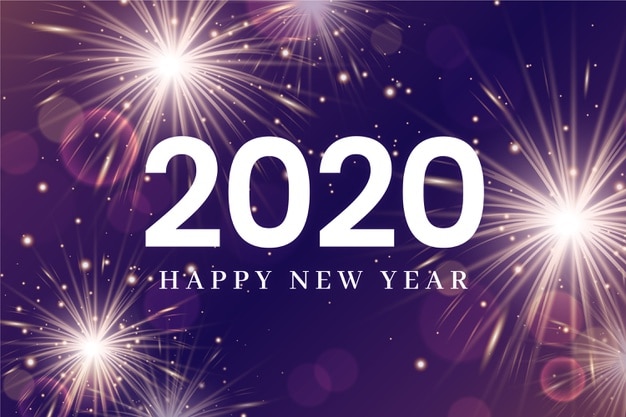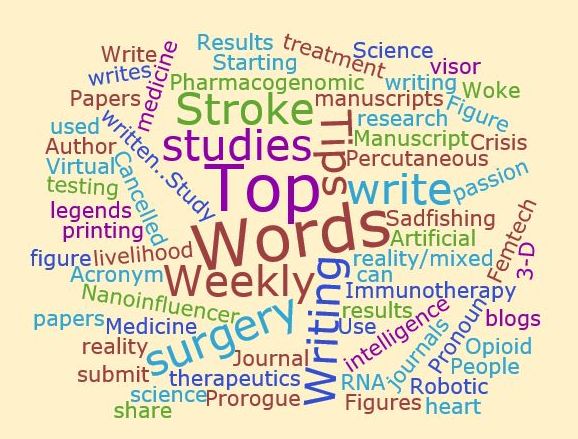To wrap up the year, I thought it might be fun to explore the Top 10 Words in 2019, with a focus on science and medicine.
Top 10 Words in Science
In a Google search of “Top 10 Science Words in 2019”, the top item was an article in The Guardian (International Edition). Their Top 10 Words for this year, compiled by David Shariatmadari, have a strong social media context:
1: People – as in the idea of the will of the people, the power of the people, the people’s vote.
2: Prorogue – as in the suspension of Parliament
3: Femtech – digital technology designed to improve women’s health and wellbeing
4: Sadfishing – the act of making exaggerated claims about one’s emotional problems to generate sympathy
5: Opioid – the synthetic molecules that mimic the effects of natural opiates and have led to an opioid crisis and epidemic
6: Pronoun – the grammatical device that refers back to a noun that was already mentioned has found a new purpose in gender self-identification
7: Woke – as in “well-informed”, is a trend gone mainstream
8: Nanoinfluencer – someone with only a thousand or so followers who nevertheless has influence on social media
9: Cancelled – as in a modern-day public figure whose social media followers turn against them
10: Crisis – as in the worsening environmental (climate), political (constitutional) and economic conditions
Top 10 Words in Medicine
A Google search for the “Top 10 Medicine Words in 2019” produced this MDLinx Top 10 Medical Innovations list compiled by Naveed Saleh:
1: Pharmacogenomic testing – to tailor medical treatments based on individual drug metabolism
2: Artificial intelligence – to assist medical diagnosis, identify pathology on diagnostic scans, and interpret huge volumes of electronic health data
3: Stroke treatment – with the treatment window extended to 24 hours for acute stroke
4: Immunotherapy – revolutionizing cancer treatment
5: 3-D printing – customized creation of health products
6: Virtual reality/mixed reality – applications for medical teaching
7: Stroke visor – able to detect brain pathologies including stroke, trauma, and swelling
8: Robotic surgery – less invasive and faster approach
9: Percutaneous heart surgery – for replacement of aortic, mitral or tricuspid heart valves
10: RNA therapeutics – treatment of RNA genetic abnormalities before they are translated into functioning or non-functioning proteins
Top 10 Words in My Weekly Writing Tips
I was curious to see which words I used most frequently in the Weekly Writing Tips I began this past September. An analysis of the blogs resulted in these most frequently used words:
Starting at #10: Acronym – Not surprising, really, when considering that I devoted an entire blog to a discussion on when it is ok to use acronyms.
#9: Author – The person doing the writing is pretty essential, so it makes sense they would earn a regular mention in my blogs. And particularly since one blog looked at how to cite publications correctly.
#8: Results – Reporting the results of a research project is what it’s all about.
#7: Journal – Those results need to get published somewhere. It’s only logical that I would refer to the preferences and submission guidelines of journals frequently in my writing tips.
#6: Manuscript – Of course!
#5: Papers – Not the wood pulp product, but a more casual term for “manuscript”.
#4: Use – the verb, along with its past tense “used”. Lots of recommendations of what to use, when to use it, and how to use it, sprinkled throughout my various blogs.
#3: Figure(s) – The best way to present your results is with a good, self-explanatory figure or two. That’s why I dedicated 2 full blogs to figures – how to create them, and how to write the accompanying figure legends.
#2: Write – The verb in its many different forms: write, writes, writing, written. Makes sense this word would show up a LOT! Especially in that blog on how to get started writing your paper.
And finally, the #1 word that showed up most frequently in my blogs: Study – the noun, and its plural form, studies. We write these manuscripts and papers and submit them to journals so that we can share the results of our studies, our research, our livelihood, our passion. It’s only fitting that Study is the #1 word in my 2019 blogs.
Looking forward to seeing which words become the mainstays of my Weekly Writing Tips in 2020. As always, I welcome suggestions for future topics.



Recent Comments